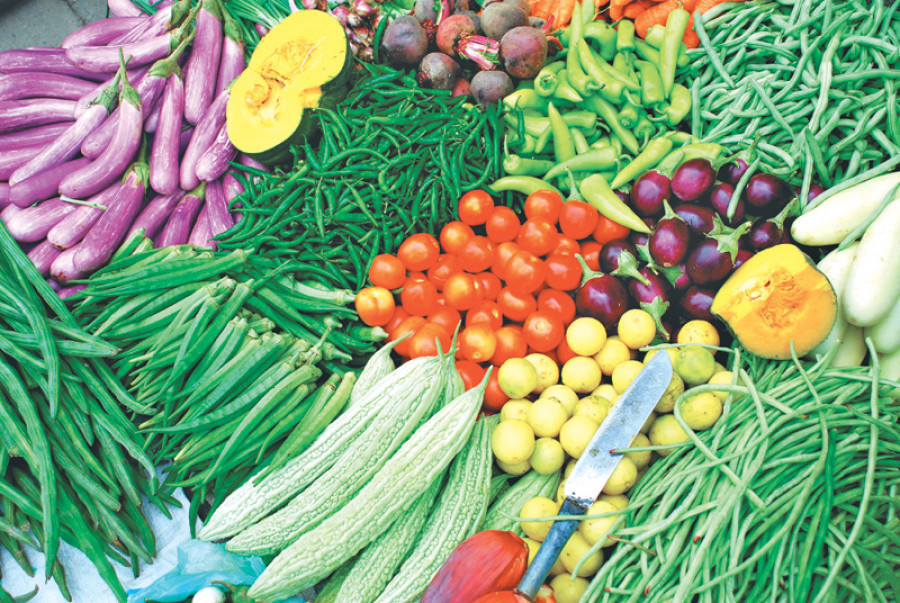Money
Pesticide residue testing labs at border points need upgrading, officials say
Fruits and vegetables with most pesticide residues are banana, orange, tomato, cauliflower, sponge gourd and beans.
Krishana Prasain
Officials at the Central Agriculture Laboratory say that the pesticide residue testing labs at the border points need to be upgraded so they can test for a wider range of pesticide residues in the fruits and vegetables that enter Nepal.
Tens of thousands of tonnes of fruits and vegetables are imported from India every year, but not one test result has come back positive for pesticide residues which is surprising, say officials.
They say that the equipment at the labs at the border points must be defective or the shipments are being allowed into the country without being tested.
In the last fiscal year, none of the samples tested by the Rapid Bioassay Pesticide Residue Unit in Sarlahi, Rupandehi and Banke was found to be contaminated.
The Rapid Bioassay Pesticide Residue Unit at Kalimati detected an enzyme inhibition percentage of above 45 percent in 29 samples of fruits and vegetables which were grown locally and imported, which means they are not fit to be eaten.
Of the total 1,877 samples collected in the last fiscal year, 1,838 were found with an enzyme inhibition percentage of below 35 percent, which means good to eat; and 10 samples were found with an enzyme inhibition percentage of 35-45 percent, which means they needed to be put in quarantine for two days.
Most of the fruits and vegetables found with pesticide residues are banana, orange, tomato, cauliflower, beans and sponge gourd.
The Rapid Bioassay Pesticide Residue Units in the country test for carbamate and organophosphate pesticides.
"Most of the pesticides under the organophosphate group have been banned in Nepal and other countries, but this does not mean that they are not using other pesticides that can be harmful to human health," said Prakash Ghimire, plant directorate officer at the Central Agriculture Laboratory.
“We have not been able to check for other types of pesticides besides carbamate and organophosphate,” he said. “We cannot say that the imported vegetables are free of pesticides on the basis of sample tests done for two groups of pesticides.”
The labs need to be upgraded so that they can test for most of the pesticides used in India, he added.
"There are a few determining factors that might have impacted the tests for pesticide residues," Ghimire said. "First, as the Rapid Bioassay Pesticide Residue Units in Nepal have been testing for organophosphate and carbamate pesticides, other types of pesticides may have been applied on the imported fruits and vegetables. The pesticide residue might also have been eliminated in transit."
Weaknesses in the sampling procedure at the customs points can also be a reason for the good results. This has raised questions over the capacity of the regional level lab units, said an official in the unit.
“Imported fruits and vegetables arriving with zero pesticide residues is somewhat strange. There may be something wrong,” said the official.
"The fruits and vegetables consumed by humans need to be pesticide residue-free, whichever pesticide is used," Ghimire said.
Of the 12,557 samples tested by the Sarlahi unit, all of them showed an enzyme inhibition percentage of below 35 percent, which means they are fit to be eaten.
The Kaski unit that collected 103 samples found 98 samples were fit to be eaten. The Rupandehi unit that collected 30,973 samples found that 30,967 samples were edible.
Banke collected 10,443 samples among which 10,443 samples were found to be fit to eat. The Kailali unit collected 6,208 samples and 6,198 were found to be fit to eat.
The Rapid Bioassay Pesticide Residue Units at Kalimati, Jhapa, Sarlahi, Kaski, Rupandehi, Banke and Kailali collected a total of 76,322 samples of fruits and vegetables.
According to the Kalimati unit, an enzyme inhibition percentage of below 35 percent means fit to be eaten, 35-45 percent means the products need to be kept in quarantine for a few days, and above 45 percent means they are not fit to be eaten and have to be destroyed.
Complaints have been received that imported fruits and vegetables found with pesticide residues are also being sold as they cannot be returned according to trade rules, said the lab.
The Kalimati unit has been testing local and imported vegetables and fruits for pesticide residues, he said, adding that the unit has also been testing for pesticide residues when any regional unit is closed. Last year, it destroyed a shipment of asparagus from Thailand after finding pesticide residues of more than 45 percent.
According to Ghimire, most of the vegetables sold at the Kalimati Fruits and Vegetable Market are grown using organophosphate rather than carbamate. Carbamate and organophosphate pesticides are highly harmful to human health and the environment. These pesticides are neurotoxic and have an effect on the nervous system, he said.




 9.83°C Kathmandu
9.83°C Kathmandu















